2021 Wall Service Awards presented to four alums pushing for change
Dec. 17, 2021 — In celebration of the 25th anniversary of the Joseph F. Wall ’41 Alumni Service Awards, four Grinnell College graduates have been chosen as this year’s award winners. Tovah Flygare ’98, Alok Shah ’04, Rachel Walman ’06, and Susan Klumpner ’09 will each use a $40,000 grant to support education, health, and environmental projects around the globe.
The award was named in honor of Joseph F. Wall ’41, professor of history and longtime dean of the College, who inspired the ideal of social responsibility in his students. It was established as a tribute to the College’s tradition of social commitment.
Each year, a committee composed of alumni (including previous Wall Service Award winners), a student, and faculty members, reviews applications and awards the prizes to either jump-start or complete a project that shows creativity and commitment to effecting positive social change. In commemoration of the 25th anniversary of the award, four winners were chosen – the most since the awards were first presented in 1997.
During those 25 years, the Wall Service Award has been presented to 60 individuals who have contributed their time and talents to 54 diverse projects throughout the U.S. and in eight other countries. The College has given out more than $1 million to the winners.
The following is a closer look at the projects of this year’s recipients.
Tovah Flygare ’98
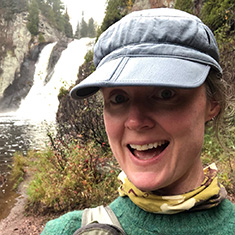 Tovah Flygare ’98
Tovah Flygare ’98
The St. Croix watershed is a nearly 8,000-square mile system of streams and rivers serving more than a million residents in Minnesota and Wisconsin. It’s also in urgent need of stewardship. Runoff from farms, homes, and industry have polluted parts of it, and where the watershed is relatively pristine, protective measures are needed to keep it that way.
Flygare is a trained steward with the St. Croix Master Watershed program (SCMWS), and she helps lead the volunteer organization. The Wall Service Award will allow SCMWS to train more citizen-stewards to address watershed health and launch a website to educate the public about ongoing projects.
Flygare is an attorney who teaches business, agricultural, and sustainability law at the University of Wisconsin-River Falls.
“When I moved to the St. Croix watershed, I found water issues literally in my backyard, as many private wells in the watershed like mine are polluted,” she says.
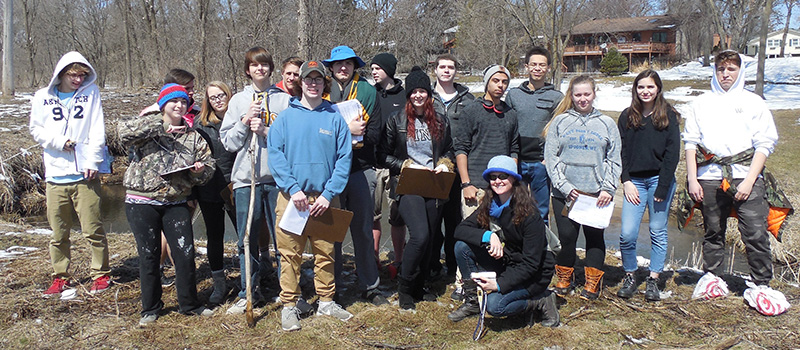 A group of students assists Tovah Flygare ’98 with a project for the St. Croix Master Watershed program.
A group of students assists Tovah Flygare ’98 with a project for the St. Croix Master Watershed program.
“SCMWS training helped me address watershed-related issues on my family land and helped me instigate several scientific, academic, and community activities that resulted in additional community interest and ongoing action.”
The Wall Award will encourage grass roots efforts by those concerned about clean water.
“Just as water connects us, I find water stewardship can connect people with different backgrounds and beliefs in a healthy community effort for safer water,” Flygare says. “With the increase in ‘green’ and water science-related jobs, our youth programs often offer an introduction to water science and related employment opportunities. Much of my organization’s stewardship work has multiple benefits for the community although water is always central.”
Alok S. Shah ’04
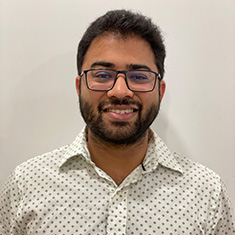 Alok S. Shah ’04
Alok S. Shah ’04
In the poorest districts of rural South Gujarat, India, more than 50 percent of women and children suffer from anemia due to iron-poor diets. The result is high maternal and perinatal mortality rates, along with fatigue, heart problems, post-partum depression, and physical and neurological problems among newborn babies.
Shah, who trained in molecular and cell biology, will use Wall funding to launch the Anemia Initiative. Over the course of a year, 30,000 rural children and adults will be screened and treated for free, and outreach teams will conduct awareness programs.
“This project is one that’s closest to my heart,” Shah says. “The power of preventative medicine lies in rooting out a lifetime of illness, and that is the power I want to tap.”
Shah was a researcher at the University of Chicago when he visited rural India and was shocked by poverty and healthcare issues. He moved to Mumbai and for the past six years he has been involved with Shrimad Rajchandra Hospital (SRH) and Shrimad Rajchandra Medical Trust, which serves a rural low-income population.
“We are planning on this to be a year-long project,” says Shah. “On the basis of the success of this project, we’ll launch a larger program in the future. But combating anemia is a long and sustained effort, and we are determined to keep at it for as long as it takes.”
Rachel Walman ’06
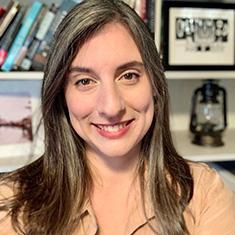 Rachel Walman ’06
Rachel Walman ’06
Walman has led high school and career training internships, but not one quite as unique as what she’ll be doing with her Wall Service Award. As director of education at New York City’s Green-Wood Cemetery, Walman’s piloting a summer internship for high school students combining academic research, job training, public history, and memorialization.
“We’re creating an outdoor classroom where youth ages 14-18 will interpret the graves in two specially selected sections of the site,” explains Walman. The cemetery, a National Historic Landmark established in 1838, is known for its grounds, architecture, and world-class statuary. The cemetery has more than 600,000 visitors annually.
The Wall Award will fund internships for 20 New York City students to restore and interpret two sections in the cemetery’s oldest public lots. Interns will unearth sunken monuments, then clean, reset and repair those and other monuments in the sections. They’ll research the lives of those buried utilizing archival records, work with horticulture staff to re-landscape the lots, then create interpretive tools such as text panels, guided tours, and content for Green-Wood’s website.
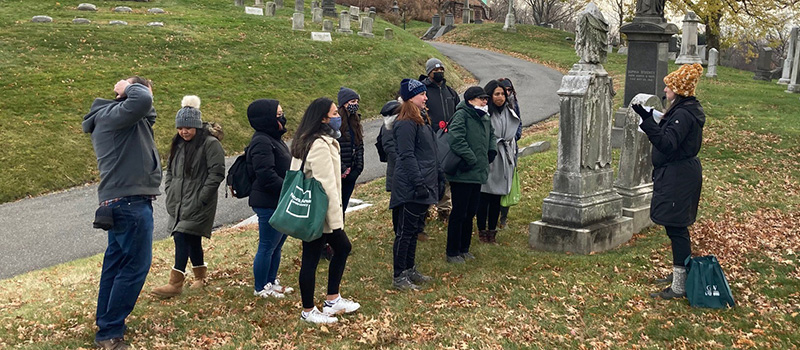 Rachel Walman ’06 gives an educational program at New York City’s Green-Wood Cemetery.
Rachel Walman ’06 gives an educational program at New York City’s Green-Wood Cemetery.
“My past experiences have given me firsthand knowledge of what makes learning stick,” Walman says. “Real work, not busy work; building relationships with experts; explicit instruction in how skills and learning connect to work outside of school; and awe-inspiring encounters with content.”
Susan T. Klumpner ’09
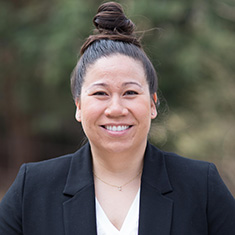 Susan T. Klumpner ’09
Susan T. Klumpner ’09
Schools in low-income communities throughout the U.S. are struggling with cuts to student services, ranging from music to tutoring to social work. The pandemic has further strained these under-resourced schools.
The Parent Mentor Program fills some of those critical gaps by recruiting and training local parents to provide academic instruction alongside teachers in kindergarten through third-grade classrooms. The program has successfully launched in Chicago, and Klumpner will use the Wall Award grant money to expand it to several Baltimore city public schools.
“We’ll contract 16 parents as mentors, as well as two parents as coordinators, to serve over 400 students in Baltimore,” explains Klumpner, associate director of field education at University of Chicago’s Crown School of Social Work. “Studies have shown that the Parent Mentor Program has demonstrated wide benefits to the classroom. Teachers report that it helps with classroom management, improves student reading and math skills, and helps social-emotional development.”
Klumpner is the co-founder of the Active Children Excel (ACE) Project, which nurtures children living in underserved communities by building character, confidence, and competency through the sport of tennis. ACE has expanded services by adding life skills, academic enrichment, homework assistance, nutrition, and social-emotional learning to the program’s core curriculum. The Parent Mentor Program further connects schools to community by drawing on the strengths of neighborhood families.
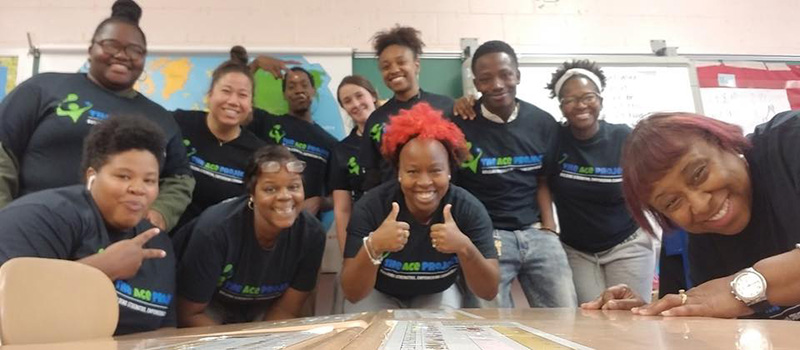 Students in Baltimore who are involved in the Active Children Excel (ACE) Project pose with Susan T. Klumpner ’09.
Students in Baltimore who are involved in the Active Children Excel (ACE) Project pose with Susan T. Klumpner ’09.
“Having parents engaged in the classroom provides experience, knowledge, and insight in schools, as well as much-needed support and perspective for teachers and school leaders,” Klumpner says.
—by Anne Stein ’84